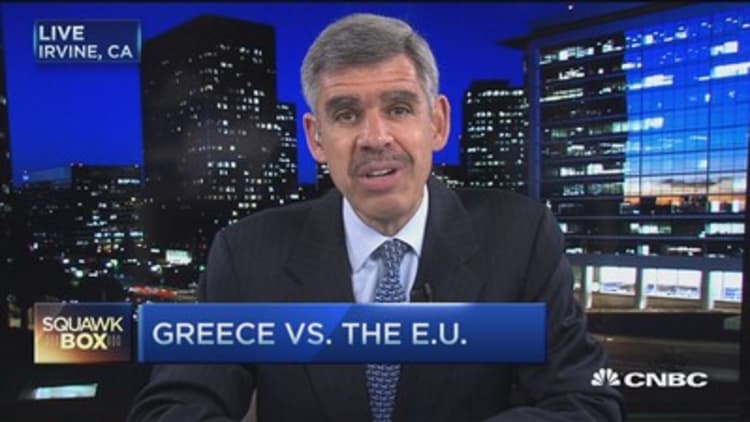
There's an ever-increasing probability of a financial "accident" involving debt-strapped Greece, Mohamed El-Erian said Tuesday.
El-Erian, chief economic adviser at Allianz, pegged the chances of an accident—referring to Greek and European officials losing the ability to control Greece's future—at 55 percent to 60 percent, which he said was higher than what he had predicted just a few weeks ago.
Greece's leftist government has been with bailout creditors over economic reforms in exchange for a rescue loan, which the government says it needs to make a debt payment to the International Monetary Fund on June 5.
"I don't think we can muddle through forever on Greece," El-Erian said on CNBC's "Squawk Box." (Tweet This)
"Deposit outflows continue," he warned.
Read MoreEl-Erian: Correctionin stocks could happen if …
Greek Finance Minister Yanis Varoufakis said he's thinking about imposing a charge on cash withdrawals from bank ATMs and on over-the-counter transactions to encourage electronic banking and to fight widespread tax evasion.
"The economy in Greece is back in recession," El-Erian said. "Capital controls are likely. The government is likely to issue an IOU in order to meet its payments."
El-Erian compared the situation in Greece to the 2001 financial crisis in Argentina. "It's very difficult to control things on the ground. I wouldn't underestimate the probability of a 'Graccident.'"
But on the positive side, the impact of a Greek accident would not sink the euro zone, El-Erian said. "This is not 2010. This is not 2012. The euro zone has done a lot to contain the risk of contagion. It doesn't mean you won't get some."
Read More Stocks are shrugging off Greek drama: Strategists
He said the immediate impact would be felt in European stocks and a further weakening of the euro currency. "There will be some spillover to the U.S., but the main impact will be in Europe."
If Greece does go under, El-Erian said he would expect a strong response from the European Central Bank "to loosen even more monetary policy and to try to protect the peripheral economies."
—The Associated Press contributed to this report.


